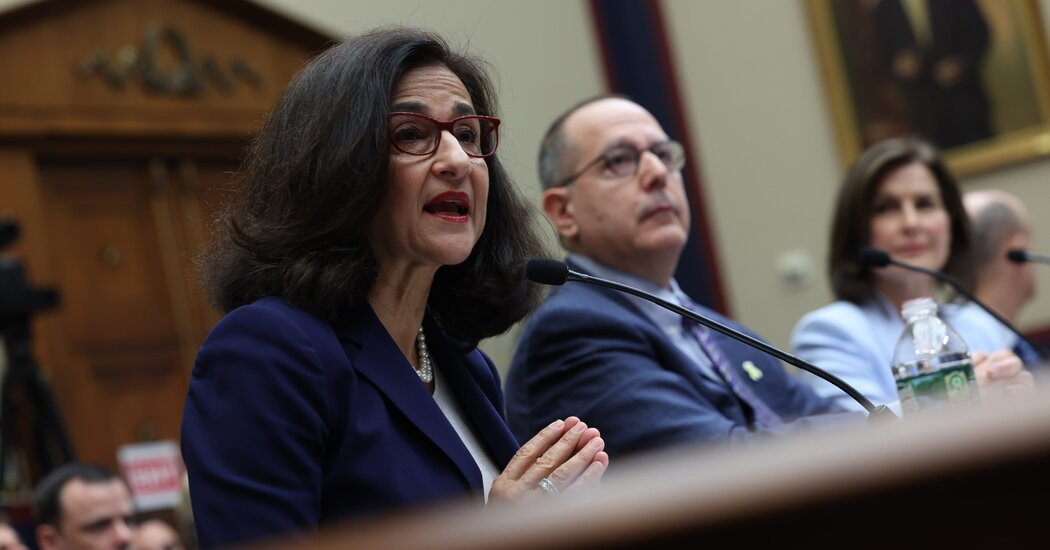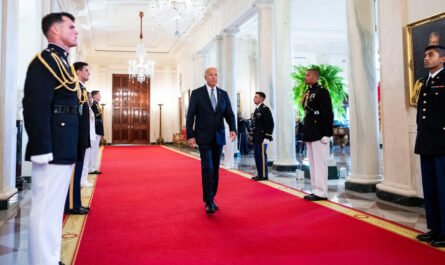Columbia University’s senate voted on Friday to approve a resolution that called for an investigation into the school’s leadership, accusing the administration of violating established protocols, undermining academic freedom, jeopardizing free inquiry and breaching the due process rights of both students and professors.
The university’s president, Nemat Shafik, has been under attack for her decision last week to summon the New York Police Department to campus, resulting in the arrest of more than 100 student protesters, and for her earlier congressional testimony, in which professors accused her of capitulating to the demands of congressional Republicans over free speech and the disciplining of students and professors.
The resolution, adopted by a vote of 62-14, with three abstentions, fell short of a proposal earlier in the week to censure Dr. Shafik, which many senators worried could be perceived as yielding to Republican lawmakers who had called for her resignation over her handling of antisemitism claims.
The senate resolution was based partly on a damaging report by the senate executive committee, which accused Dr. Shafik’s administration of engaging in “many actions and decisions that have harmed” the institution — including the hiring of an “aggressive” private investigation firm.
The report, which was discussed in Friday’s meeting, said that investigators harassed students and used “intrusive investigation methods,” which included “investigators’ attempt to enter student rooms and dormitories without students’ consent.”
Investigators, the report said, demanded “to see students’ phones and text messages with threats of suspension for noncompliance.”
The report found that, “Overall, the fundamental lack of good-faith engagement with all campus constituencies and groups has exacerbated the situation and has served to divide our community.”
The resolution also calls for establishing a senate task force to investigate university decision-making.
In a statement following the senate vote, a spokesman for the university said the administration and the senate “share the same goal of restoring calm to campus so everyone can pursue their educational activities. We are committed to an ongoing dialogue and appreciate the Senate’s constructive engagement in finding a pathway forward.”
The resolution may have little practical impact. The senate, made up of faculty, students and administrators, is not empowered to remove the president. But some senators expressed concern during the two-hour meeting that the resolution could further erode Dr. Shafik’s relationship with the Columbia community, heightening the crisis facing the campus.
The chaos engulfing the university over the war between Israel and Hamas, and the administration’s handling of an encampment of student protesters on campus, have led to calls for Dr. Shafik’s resignation from disparate groups, including congressional Republicans and pro-Palestinian demonstrators.
During the meeting on Friday, Nachum Sicherman, a professor of economics, urged senators to take outside interference into account and to vote against the proposal.
“We are in a serious crisis, and I don’t see how weakening a president who is under attack from both the right and left is going to help resolve the crisis,” he said.
During the debate, which was at times heated, some senators raised questions about whether the body should have specifically addressed claims of antisemitism on campus.
Carol Garber, a professor of behavioral sciences, said she feared that the senate resolution “has ignored the impact of the hostile and aggressive language and actions toward Israeli and Jewish students, faculty and staff on this campus.”
The resolution said that university actions in response to current events had made “studying, teaching and research increasingly difficult for many students, faculty and other members of the Columbia community.”
Karla Marie Sanford and Eryn Davis contributed reporting



